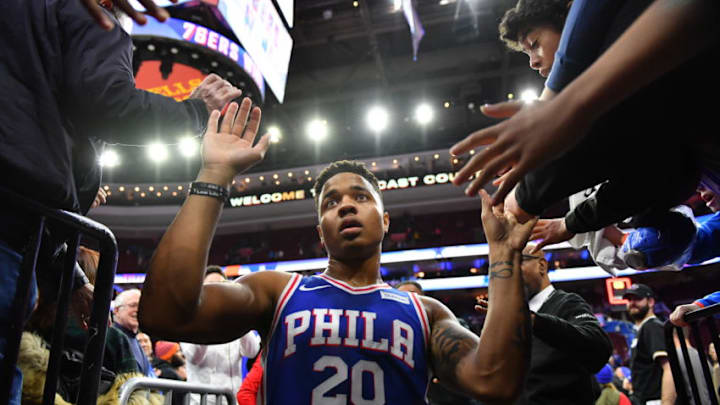While he’s still not the player he was or can be just yet, Markelle Fultz’s return gives us some important reminders about draft picks.
Markelle Fultz‘s battle to finally get back on the court ended Monday night in a heartfelt return. Philadelphia was the perfect city to welcome him back and cheer for anything imaginable. Fultz was steady and perhaps better than expected with 10 points, eight assists and one throwback hesi pull-up jimbo.
He has a long way to go to maximize his talent, but this was good to see. The mental steps he took can’t be understated.
Rather than talking about what he did on the court, we’re going to put his return into context. It’s important context, especially for thinking about prospects and the NBA Draft. This game is by no means an indication that Fultz is “back” or that he will live up to the billing of a No. 1 overall pick. However, it’s clear that far too many people gave up on him after four games.
Yes, the videos of his shooting were painful and worrisome. Sure, it may have been the most bizarre sequence of any top player or prospect seemingly losing form and confidence. (Well, until Kawhi Leonard said, “Hold my beer”). Yet, with everything we know about the adversity Fultz has overcome, with everything we know about the player-first head coach Brett Brown and the fact that Fultz is still 19 years old, it’s a bad look for so many to have written him off.
Getting younger
This circles around to a larger point. One of the biggest failures on all levels, from fans and media to front offices, is they give up on kids and younger players far too early. A lot of this is a part of flawed drafting. Countless players end up in terrible situations, like Mario Hezonja and just about every other pick to end up in Orlando. Some escape and go on to redeem themselves on their second contracts, but many don’t.
Outside of drafting, we have to take how the NBA Draft has changed into consideration. Most kids making the jump to the league are just 20 or 21 by the end of their rookie year. They’re not fully mature yet, they haven’t maximized their bodies and they’re not used to a rigorous NBA lifestyle. At this point, these prospects are still closer to being kids than adults.
The youth movement in the draft makes selecting more difficult, but it doesn’t change the fact that what we need is more patience, from all parties involved. Look at the countless players that have seemingly improved out of nowhere this season: Kris Dunn, Victor Oladipo, Aaron Gordon, the list goes on.
Preaching patience
Unless you’re in the gym with a given player every single week or every day, you can’t say or know what they’ll become. Too often players are kicked to the curb too quickly. It’s not just the Magic either. Teams are wasting money and picks because they either can’t or won’t develop talent. Now, the Sixers invested a ton in Fultz, so obviously they weren’t going to give up on him. It is, though, a nice reminder of what could happen when you support your younger players.
In a unique situation, from what we can tell, the Sixers supported Fultz and literally put the ball in his court. When he told coach Brett Brown he was ready, Fultz played later that night. It’s an abnormal case, but we can use it as a reminder about how important the draft process is. The ability to draft well, develop, support and remain patient is the key to all of that.
Next: 2017-18 Week 24 NBA Power Rankings
Lastly, for fans and media, maybe this can be another reminder to stop making statements about prospects after a month of the season. Stop with using words like “never” and “will always be.” We’re already seeing the likes of Fultz, Josh Jackson, Frank Ntilikina and Donovan Mitchell make huge strides. Support each rookie class and give them a fair shot. As Oladipo has shown us this year, we have a long ways to go before being able to confidently say what a player is or isn’t.
